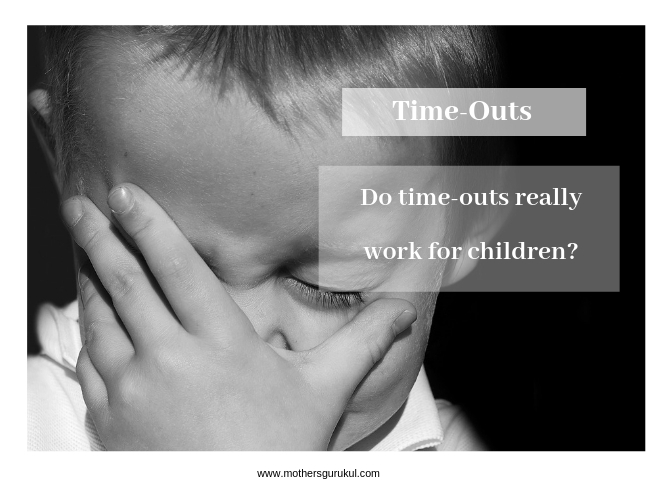Let’s talk about something which no kid would like to experience. Time outs. Kids test our patience. They push our buttons and we get angry, frustrated, irritated. Sometimes, we yell, and sometimes it goes beyond that as well. We are human beings after all. We have our patience level. If our child repeatedly misbehaves or go against our expectations, it puts us in a stressful state. We give them ultimatums, warnings and when nothing works, we practice time-outs. But very soon, time-outs also start losing its importance if done on a regular basis. Why? Is it because kids are smart than we think they are or is it because our way of disciplining them is wrong or outdated or is it because time-outs is not a solution for long run? My answer is the last reason. Time-outs are not for the long-term solution.

Edits: www.canva.com
Last week, I was listening to a podcast on myths about parenting. And that’s when this idea struck to me that I should write a post on time-outs. One of the myths we all live with is if we are not able to discipline our kids then we think of ourselves as a weak parent. I felt that’s true to some extent. When we see a child behaving so well at a party, we start judging our parenting style. We start to evaluate what we do towards parenting our kids. One of the favorite disciplinary methods of parents is time-outs. But I feel time-outs do not work in every situation. The reason I feel this way is because of many reasons,
Does the Time-out is related to a specific behavior?
Children see everything as white and black. There is nothing grey for them. They don’t understand any complicated calculations. When disciplining the child, if the consequences are related to the specific act then they get it. Putting it in simple words think for a child how is sitting on a specific spot for 2 minutes is related to throwing a ball or a block at his/her sibling? There is actually no relation between the two situations.
How is the child taking it emotionally?
Making a 2.5-year-old sit on a chair for 5 minutes because s(he) wasn’t listening to you is not going to help them in understanding the reason but it will make them feel bad, sad and stressed out. If your child may keep on crying for the entire 5 minutes. So, have you solved the purpose of giving time-out?
What exactly is your child learning during a time-out in terms of correct behavior?
To be honest, nothing. By giving our children time outs, we are letting go of the opportunity of telling them what went wrong.
I am not saying that I have never given time-outs to my kids. I did but I never went over. I used them only when needed and that also rarely. I believe in explaining to them why they are not supposed to do it. And instead of calling it a time-out for them, I would rather call it a mommy time-out.
So, when it is not a solution then there have to be some alternatives to it:
For young kids (under 3)
Distraction works great. You may think of removing the object that is the cause of the behavior or just take the child away from that particular spot. Get engaged in some interesting activity. It can be as simple as counting the birds sitting on the wire. Or how many spoons are there in the holder.
Little older kids:
By now, kids start to act independently. They take pride in doing things like big kids. They demand undivided attention. So, if you think your phone or laptop is the reason for their bad behavior then think of going a few hours or minutes of technology detox. Believe me, it is good for both of you. To a kid, even negative attention is better than no attention. So, give those distraction-free minutes to your child.
Teach them what you expect from them:
Yes, I said to teach them not to tell them. For example, instead of saying “I need a snack”, teach your child to practice saying can I have a snack, please? Reframing your sentences goes a long way. But don’t forget to practice this yourself. I used to play thing game with my daughter and now I do that with my son. We switch roles and then hold a conversation.
Be clear about the ground rules:
This takes us back to the point where we have started. Consequences should always be related to the behavior.
Kids need attention. They need love, a listening ear, empathy. No matter if they are young or old, they all deserve this. So, stay calm, be firm, give them the attention they need, set clear ground rules and enjoy parenting.
Check out this interesting article https://www.ahaparenting.com/parenting-tools/positive-discipline/timeouts
